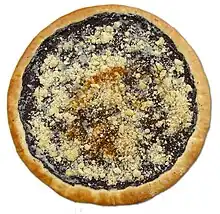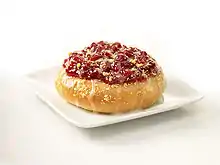 Larger koláč, called "frgál", typical of the Moravian Wallachia area | |
| Type | Sweet bread |
|---|---|
| Place of origin | Czechia and Slovakia |
| Region or state | Central Europe |
.JPG.webp)

A kolach,[1] from the Czech and Slovak koláč (plural koláče, diminutive koláčky, meaning "cake/pie") is a type of sweet pastry that holds a portion of fruit surrounded by puffy yeast dough. Common filling flavors include tvaroh (a type of cottage cheese), fruit jam, poppy seeds, or povidla (prune jam). In the United States, the letter "s" is often added to the end of the word kolache to form the word "kolaches"; this is a double plural.
Background
Originating as a semisweet pastry from Central Europe, kolache have become popular in parts of the United States.[2] The name originates from Bohemian, originally Old Slavonic word kolo, meaning "circle" or "wheel".
Traditional Czech koláče are used in villages during feasts as a treat or at important events, such as weddings. They are usually small, with a diameter of no more than 8 cm (3.1 in) and with only one type of filling, sprinkled with sweet crumbs or sugar.

Variants
In Moravia, large koláče are popular. In some areas, they have regional names: for example, in Wallachia, they bake so-called frgály, approximately 25 cm (9.8 in) in diameter. These are made of yeast dough and are most often filled with jam from apples, pears, or plums. In southern and western Bohemia (especially in the Chod region), koláče are also large in diameter and decorated with contrasting ornaments, most often made of povidla, poppy seeds, and cottage cheese. They are served cut into triangles, similar to pizza.

In some parts of the US, especially in Houston, Texas, klobásník (or klobasnek), which contains sausage or other meat, is also called kolach, because the same kind of dough is used.[3] This pastry is more closely related to a pig in a blanket, however.[4] In contrast, a Czech koláč is always sweet.[5] Unlike kolache, which came to the United States with Czech immigrants, klobásníky were first made by Czechs who settled in Texas.[6][7] In Texas, kolaches are often known among people not of Czech origin as "sweet kolaches", while klobasneks are called kolaches.[3]
Kolache are often associated with small towns in the midwestern United States, where they were introduced by Czech immigrants. They are served at church suppers and on holidays but also as an everyday comfort food. Recipes are usually passed down, with some including spices like mace or nutmeg. They can be filled with a combination of prune, apricot, cream cheese, poppy seed, or assorted other fillings.[8]
Holidays and festivals
Bujanov (a municipality in the South Bohemian Region of Czechia) holds annual koláč celebrations (Koláčové slavnosti) and a koláč marathon (Koláčový běh).[9]
Several US cities hold annual koláč festival celebrations:
Both Verdigre, Nebraska, and Montgomery, Minnesota, claim to be the "kolache capital of the world".[12][13] Prague, Nebraska, claims to be known as the home of the world's largest koláč. Both Caldwell, Texas, and West, Texas, claim the title of "Kolache Capital" of the state,[14] and kolache are popular in Central and Eastern Texas.[15][16] They are part of the Texas Czech Belt,[2] which grew in the 1880s and is full of koláč bakeries.[2]
See also
- Danish pastry: a laminated sweet pastry
- Koloocheh: Iranian pastry
- Vatrushka: East Slavic pastry
References
- ↑ "kolacky". Dictionary.com Unabridged (Online). n.d. Retrieved 22 January 2016.
- 1 2 3 Davis, Wynne (28 November 2016). "The Czech Pastry That Took Texas by Storm, and Keeps Gaining Strength". NPR.org. Archived from the original on 17 April 2019. Retrieved 17 April 2019.
- 1 2 Johnston, Abby (24 August 2018). "If It's Not Sweet, It's Not a Kolache—It's a Klobasnek". Texas Monthly. Archived from the original on 8 April 2023. Retrieved 16 April 2023.
- ↑ "Czech, Please: 2000s Archive: gourmet.com". Prod.gourmet.com. 1 August 2011. Archived from the original on 17 March 2012. Retrieved 20 February 2012.
- ↑ "Jak šly české koláče do světa. Američané 'kolaches' milují". Lidovky.cz. 3 February 2015. Archived from the original on 8 February 2021. Retrieved 3 June 2023.
- ↑ Siegel, Jeff (January 2014). "The Kolach Trail". Texas Co-op Power: 11.
- ↑ Limón, Elvia (25 July 2019). "Is Texas the only state with kolaches, or do other states also have them? Curious Texas investigates". Dallas News. Archived from the original on 16 April 2023. Retrieved 16 April 2023.
- ↑ Stern, Jane; Stern, Michael (2005). Roadfood: The Coast to Coast Guide to 500 of the Best Barbeque Joints, Lobster Shacks, Ice Cream Parlors, Highway Diners and Much, Much More. ISBN 9780767922647. Archived from the original on 16 August 2023. Retrieved 19 August 2019.
- ↑ "Obec Bujanov". Archived from the original on 21 January 2021. Retrieved 4 February 2021.
- ↑ "Michele Casady, "Rain and kolaches? Czech"". Bryan-College Station Eagle, 13 September 2009. Archived from the original on 15 September 2009. Retrieved 24 October 2009.
- ↑ "Czech & Kolache Festival : Agricultural Heritage & Resources". Agriculturalheritage.org. 22 February 1999. Archived from the original on 29 August 2011. Retrieved 28 December 2019.
- ↑ "Village of Verdigre". Archived from the original on 5 September 2010. Retrieved 16 March 2012.
- ↑ "Montgomery, Minnesota City Information". US-MN: ePodunk. Archived from the original on 5 February 2012. Retrieved 20 February 2012.
- ↑ "Official Capital Designations | TSLAC". Tsl.state.tx.us. 26 July 2019. Archived from the original on 23 October 2012. Retrieved 28 December 2019.
- ↑ Dao 2017-04-10T10:00:00-04:00, Dan Q. (18 March 2019). "Kolache Are the Texas Breakfast Staple Worth a Trip to the Lone Star State". SAVEUR. Archived from the original on 23 June 2019. Retrieved 17 April 2019.
{{cite web}}: CS1 maint: numeric names: authors list (link) - ↑ "Where to find the best kolaches in Texas". ABC13 Houston. 16 August 2018. Archived from the original on 17 April 2019. Retrieved 17 April 2019.
External links
 The dictionary definition of kolach (cake) at Wiktionary
The dictionary definition of kolach (cake) at Wiktionary Media related to Kolache at Wikimedia Commons
Media related to Kolache at Wikimedia Commons Works related to Kolache at Wikisource
Works related to Kolache at Wikisource- Kolach video produced by Wisconsin Public Television